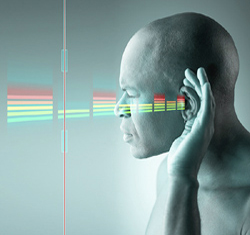
The eyes and ears do not always agree when it comes to sound quality.
If making acoustic measurements is so difficult, why bother? Why not tune the system based solely on listening? Because there are several very good reasons for including our eyes in the system tuning process!
We humans base our concept of reality upon the evidence presented by the five senses to the brain. Our concept of “blue sky” or “green grass” is the result of the tuning of our visual system and the programming of our brains. If our visual system were tuned to sense a different part of the electromagnetic spectrum, then our perceptions about reality would change.
Our sense of sight is programmed with base-line reference values from the day we’re born. We know what the sky should look like, and we know what the grass should look like. As far as we know, “green” and “blue” mean the same thing to everyone.
This is why we can walk into an electronics retailer, gaze at a wall of television sets, and pick out the one that has the “best” picture. The best one is the one that conforms the closest to our base-line programming of what certain colors should look like.
No “Aboslutes”
Our hearing system has no such set of “absolute” references. Most of the sound events that we hear each day are man-made. Depending upon your walk in life, the sounds that you hear most often are probably different than the sounds that I experience. Only those who have undergone special sensory training have a concept of what the “correct” sound of a violin, piano or any musical instrument is—and even that is controversial among the “experts.”
The realm of sound is a subjective world, one that is devoid of absolute standards that form benchmarks for what we perceive. I may feel that a Gibson guitar sounds the “best,” and you may feel that a Fender sounds better. There is no absolute benchmark to justify either position, so it simply ends up being a matter of opinion.
Loudspeakers are much the same way. I may feel that the “Blowsound 2000” sounds much better than the “StackNBlast Z-12,” and you may have the opposite opinion. Without a standard there is no way to justify either position, so we just have to agree to disagree.
Measurement provides the standard by which we can justify an opinion of what sounds “best.” Because loudspeakers ideally are reproducers of sound (as opposed to producers), and since we can measure what goes in (electrical energy) and what comes out (acoustical energy), we have a benchmark by which to judge the accuracy of the loudspeaker.
If a loudspeaker “sounds good” when playing back a Rob Zombie CD, yet its measured magnitude response looks like the Swiss Alps, then we can brand it as “inaccurate” with good authority. Accuracy is not necessarily a prerequisite for (subjectively) “good” sound.















